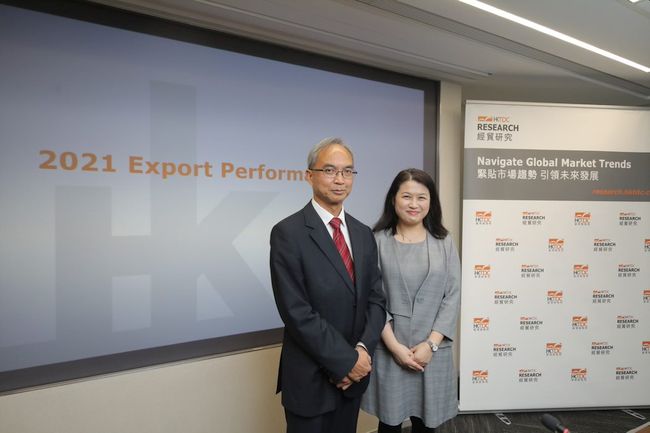COVID-19 volatility and spiking logistics costs impact sentiment
The Hong Kong Trade Development Council (HKTDC) forecasts that Hong Kong exports will grow by 8% in value in 2022, down from the 25% expansion experienced in 2021. An uneven recovery, lingering threats from the COVID-19 pandemic, global supply chain disruptions and logistics bottlenecks, as well as rising concerns over inflation, are expected to restrain growth, HKTDC Director of Research Nicholas Kwan said.

In the most recent HKTDC Export Index survey, more local exporters (87%, up 20.4 percentage points from the previous quarter) said the pandemic had negatively affected their business. Soaring transport costs (60.2%), disruptions to logistics and distribution (53.2%) as well as difficulties in sourcing raw materials/parts and components (41.4%, up 16.8 percentage points) were cited as major impacts. More than 70% of Hong Kong exporters said they expect 2022 sales will decrease (42.6%) or just be on par (29.1%) with sales this year.
COVID-19 remains biggest threat
In the first 10 months of 2021, Hong Kong exports surged 26.7% year-on-year, albeit from a low base. “The remarkable growth outshone the global average, demonstrating the resilience of the city’s export sector. Nonetheless, lingering pandemic and market uncertainties are likely to cast a shadow on the local export performance in the coming year,” Mr Kwan said.
He added that the impact of COVID-19 (32.5%) remains local exporters’ top concern, followed by a stuttering economic recovery (15.7%) and borders remaining closed (11.6%).
From ‘just-in-time’ to ‘just-in-case’
Mr Kwan said COVID-19-related delays in shipments and issues related to port closures and congestion have adversely impacted the global supply chains in many areas. While 71.3% of respondents reported delivery delays, 39.8% experienced production schedule disruption and 38.4% passed extra shipping costs on to customers. Many exporters (62.4%) expect logistics costs to continue rising in the first quarter of 2022, with 39.8% anticipating an increase in the range of 10-30%.
He said manufacturers may reserve more buffer time for production in the pandemic recovery period. “Take the automobile industry as an example, where companies are switching from a ‘just-in-time’ strategy, with semiconductor chips, parts and components only delivered as needed, to embracing a ‘just-in-case’ strategy where they stock up on inventory to combat logistics bottlenecks.”
New products, new markets
On the bright side, the Regional Comprehensive Economic Partnership (RCEP) agreement takes effect on 1 January 2022. “With its phased tariff elimination, the RCEP is set to further develop and integrate regional supply chains, as well as encourage production specialisation in Asia. This will provide a fresh impetus for Hong Kong to fortify its role as an international trading hub,” Mr Kwan said.
Considering business strategies in 2022, almost half of the exporters surveyed (46.4%) indicated they planned to develop other product categories, with some opting to develop domestic markets in Mainland China (33.8%) or diversify sales to other overseas markets (30.5%).
Toy sector bearish
Meanwhile, the HKTDC Export Index dropped 1.8 points to 37.2 in the final quarter of 2021, “indicating that growing market uncertainties triggered by COVID-19 variants may continue to undermine local exporters’ confidence in the near term,” said HKTDC Assistant Principal Economist (Greater China) Alice Tsang.
Machinery (44.1, up 0.3 points) was the most promising sector, jewellery (40.7. up 0.8) and clothing (39.6, up 3.5) improved, while toys, down 19.0 points to 25.0, was the least optimistic sector. Exporters were equally cautious on major markets. Mild growth was expected in the Association of Southeast Asian Nations (ASEAN) bloc (45.8, up 1.3) and Japan (48.7, up 0.8), while the mainland market remained stable (47.6, down 0.2) and the United States fell 1.4 points to 42.9.
The Procurement Index and the Employment Index were more or less the same as the previous quarter, at 36.9 and 44.0 respectively. The Trade Value Index (57.0) remained in expansionary territory.
A total of 500 local traders from six major industry sectors including clothing, electronics, jewellery, machinery, timepieces and toys were interviewed for the HKTDC Export Index survey in mid-November. Readings above 50 indicate a positive sentiment, while below 50 is negative.
References
– HKTDC Research website: http://research.hktdc.com/
– HKTDC Export Index 4Q21: Exporter Sentiment Declines as Covid-19 Resurges and Logistics Costs Spiral https://bit.ly/3yC337H
– Hong Kong Export Outlook for 2022: Moderate Growth Amid Lingering Risks from Covid-19 and Growing Threats of Inflation https://bit.ly/3EWwN1b
– Podcast https://bit.ly/3pXDPfJ
– Photo download: https://bit.ly/3pWHKJQ
About HKTDC
The Hong Kong Trade Development Council (HKTDC) is a statutory body established in 1966 to promote, assist and develop Hong Kong’s trade. With 50 offices globally, including 13 in Mainland China, the HKTDC promotes Hong Kong as a two-way global investment and business hub. The HKTDC organises international exhibitions, conferences and business missions to create business opportunities for companies, particularly small and medium-sized enterprises (SMEs), in the mainland and international markets. The HKTDC also provides up-to-date market insights and product information via research reports and digital news channels. For more information, please visit: www.hktdc.com/aboutus. Follow us on Twitter @hktdc and LinkedIn
Media enquiries:
HKTDC’s Communication and Public Affairs Department
Beatrice Lam, Tel: +852 2584 4049, Email: beatrice.hy.lam@hktdc.org















